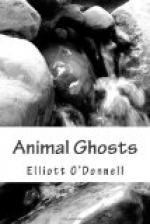“This becomes all the more probable when one considers how very impressionable the cat is—how very sensitive to kindness. There are some strangers with whom the cat will at once make friends, and others whom it will studiously avoid. Why? The explanation, I fancy, lies once more in the occult—in the cat’s psychic faculty of smell. Kind people attract benevolently disposed phantoms, which bring with them an agreeably scented atmosphere, that, in turn, attracts cats. The cat comes to one person because it knows by the smell of the atmosphere surrounding him, or her, that it has nothing to fear—that the person is essentially gentle and benignant. On the contrary, cruel people attract malevolent phantoms, distinguishable also to the cat by their smell, a smell typical of cruelty—often of homicidal lunacy (I have particularly noticed how cats have shrunk from people who have afterwards become dangerously insane). Is this sense of smell, then, the keynote to the halo of mystery that has for all times surrounded the cat—that has led to its bitter persecution—that has made it the hero of fairy lore, the pet of old maids? I believe it is—I believe that in this psychic faculty of smell lies, in degree, the solution to the oft-asked riddle—why is the cat uncanny? Having then satisfied oneself on this point, namely, that cats are in the possession of rare psychic properties, is it likely that the Unknown Powers which have so endowed them, should withhold from them either souls or spirits? Is it not contrary to reason, instinct, and observation to suppose that the many thoroughly material and grossly minded people—people whose whole beings are steeped in money worship—we see around us every day should have spirits, and that pretty, refined and artistic-looking cats, whose occult powers place them in the very closest connection with the superphysical, should not? Monstrous—the bare conception of such incongruity in the one case, and such an omission in the other, is inconceivable, wholly irreconcilable with the notion of any other than a mummer of a creator—a mere court fool of a God.”
CHAPTER II
APPARITIONS OF DOGS
One of the most extraordinary cases of hauntings by the phantasms of dogs is related in an old Christmas number of the Review of Reviews, edited by the late Mr. W.T. Stead, and entitled “Real Ghost Stories.”
“The most remarkable,” writes Mr. Stead, “of all the stories which I have heard concerning ghosts which touch is one that reaches me from Darlington. I owe this, as I owe so many of the other narratives in this collection, to the Rev. Harry Kendall, of Darlington, whose painstaking perseverance in the collection of all matters of this kind cannot be too highly praised. Mr. Kendall is a Congregational minister of old standing. He was my pastor when I was editing the Northern Echo, and he is the author of a remarkable book, entitled All the




